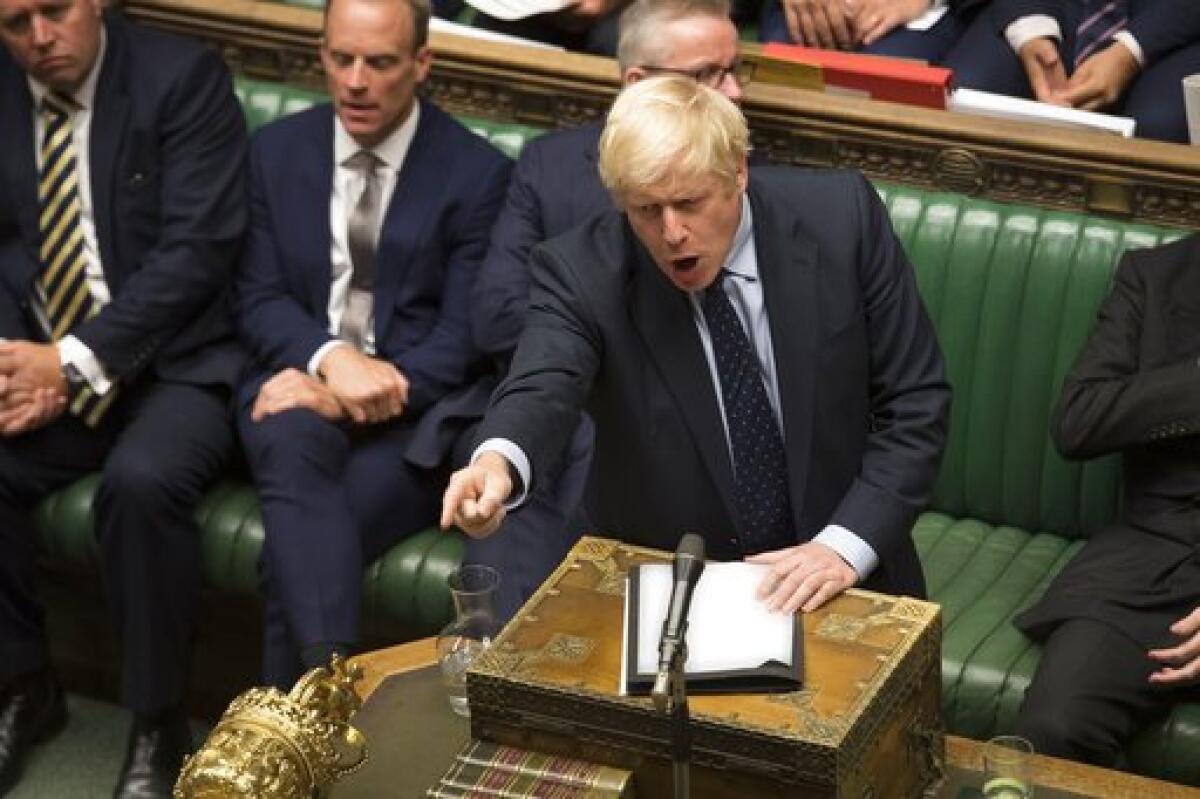Editorial: Boris Johnson’s Brexit gambit casts a shadow on peace in Northern Ireland

- Share via
The 1998 Good Friday Agreement has led to more than two decades of peace in Northern Ireland, where some 3,600 lives were lost during the so-called Troubles in the latter part of the last century.
Even after the disastrous decision by British voters in 2016 to leave the European Union — which among other consequences weakened ties between the two parts of the island of Ireland — the U.K. government has insisted that it recognizes the importance of safeguarding the Good Friday Agreement and the peace process.
But the commitment of the United Kingdom to the spirit of the Good Friday Agreement is being called into question. As the U.K. and the EU continue to negotiate on post-Brexit trade relations, Prime Minister Boris Johnson is pursuing legislation that by the admission of one of his own ministers would violate international law (albeit in “a very specific and limited way”).
The United Kingdom Internal Market bill, which received preliminary approval in Parliament on Monday, would allow Britain to make unilateral changes in the agreement it reached with the EU last year to manage its departure from the alliance, a document that has the status of international law. (On Wednesday, Johnson agreed that any changes ultimately made to the agreement would still require the approval of Parliament.)
That Brexit agreement contains a protocol that aims to prevent a “hard border” between Northern Ireland, a part of the U.K., and the Republic of Ireland, a member state of the EU. For example, some EU rules (including those regulating some government subsidies for business) continue to apply in Northern Ireland, and customs officials can conduct checks of goods entering Northern Ireland from elsewhere in the U.K. that are “at risk” of entering the Irish Republic. Johnson’s bill would allow the British government to override some of those provisions.
Johnson has described his legislation as a “safety net” to protect the integrity of the U.K. It was necessary, he said, to prevent “extreme or irrational interpretation” of the protocol dealing with Northern Ireland that could lead to a border in the Irish Sea separating Northern Ireland from the rest of the U.K.
The legislation has been criticized — including by some of Johnson’s predecessors — for the damage it might do to the U.K.’s reputation. Theresa May, Johnson’s immediate predecessor, asked: “How can the government reassure future international partners that the U.K. can be trusted to abide by the legal obligations of the agreements it signs?”
But Johnson’s push for this legislation is also ominous for what it might mean for the fragile peace in Northern Ireland.
That is why it has drawn criticism not just from the EU and the Irish Republic, but also from leading figures in the United States, which played an influential role in the negotiations that led to the Good Friday Agreement. House Speaker Nancy Pelosi (D-San Francisco) has warned Britain that if it violated the withdrawal agreement and undermined the Good Friday accord, “there will be absolutely no chance of a U.S.-U.K. trade agreement passing the Congress.” On Wednesday, Democratic presidential nominee Joe Biden tweeted: “We can’t allow the Good Friday Agreement that brought peace to Northern Ireland to become a casualty of Brexit.”
The Trump administration is more trusting of Johnson’s motives. At a news conference on Wednesday with British Foreign Secretary Dominic Raab, Secretary of State Michael R. Pompeo said that when it comes to Northern Ireland and the EU negotiations “I am confident they’ll get it right.” For his part, Raab said: “Our commitment to the Good Friday Agreement, and to avoid any extra infrastructure at the border between the north and south, is absolute.”
The peace process in Northern Ireland was immeasurably aided by the fact that both the U.K. and the Irish Republic were members of the EU. But now that Brexit has been accomplished, it’s important that the U.K. continue to recognize the unique challenge posed by Northern Ireland, a place in which some inhabitants, mostly Protestant, see themselves as British, while others, mostly Catholics who historically suffered discrimination, identify as Irish.
Even before the Good Friday Agreement, the U.K. had recognized that close connections between the northern and southern parts of Ireland were vital in promoting and preserving peace. In 1993, then-Prime Minister John Major declared that the British government had “no selfish strategic or economic interest in Northern Ireland” and would accept the decision of the majority of the people of Northern Ireland about whether they wanted to remain part of the U.K. The British government reaffirmed that position in the Good Friday Agreement.
That same recognition that Northern Ireland is a unique case led to the provisions about Northern Ireland in the withdrawal agreement. Were Johnson’s government to override some of those assurances, even with parliamentary approval, trust in the peace process could begin to fray.
Johnson may be acting out of sincere concern about expansive EU interpretations of the withdrawal agreement, or he may be trying to pressure the EU to conclude a trade agreement more favorable to his country. Whatever his motivation, the prime minister has needlessly raised concerns about the U.K.’s commitment to a historic and hard-won agreement to end decades of strife in Northern Ireland. Parliament shouldn’t cooperate in casting doubt on that commitment.
More to Read
A cure for the common opinion
Get thought-provoking perspectives with our weekly newsletter.
You may occasionally receive promotional content from the Los Angeles Times.










